Immediate action against ethnocide is needed this week, specifically Saturday, September 30, in the Oceti Sakowin Oyate homelands! Known Pretendian keynoting History Conference thus sidelining actual Native people. Show up to support our relatives on Saturday, September 30 in Sioux Falls. #N8VoicesBack
Read moreHistorian Nick Estes: NGPHC’s Response to Kent Blansett
Sept. 20, 2023
To the Board of the Northern Great Plains History Conference
Since July, there have been at least three separate news articles detailing the objections by Native organizations and tribal officials to Kent Blansett’s disputed affiliations with at least five American Indian nations. Many colleagues and Native community members have expressed concern about Blansett’s participation as a keynote in the NGPHC’s conference next week.
What is NGPHC’s response to the elected tribal leaders, Native scholars, and community members genuinely and sincerely questioning Blansett’s credibility?
In response to public outcry, Blansett recently muddied the waters with a self-published family genealogy and lengthy service bio posted to his KU faculty page. The truth is that none of the alleged documentation or personal family narratives are a substitute for provable ties to American Indian nations. As a member of the Lower Brule Sioux Tribe and as a scholar of American Indian studies and history, I know from years of professional service to Native communities that individual claims do not—nor will they ever—trump the collective, sovereign right of tribes to determine their membership and belonging. This includes the category of descendancy. We are nations bound by collective sovereignty, not individual affiliations or self-selected titles.
These are not theoretical or abstract matters. While we are familiar with government schemes to take and seize Native land, there is less of a focus on how the destruction and disparaging of our tribal belonging and citizenship are part of elimination policies. Despite implacable tinkering of the laws to undermine tribal citizenship, tribes have never renounced their right to determine their own. And yet, the continued denial of tribal citizenship and belonging has done immeasurable harm.
My own family members, like most Native families, have harrowing and painful stories of survival and loss at boarding schools. Recent federal investigations into boarding schools have shown how more than a century of genocidal policy attempted to systematically disintegrate tribal solidarity and membership through child removal and forced assimilation. The goal was to access Native and land resources by destroying the very glue that held together tribes—Native families.
Fraudulent claims of Native identity trivialize those painful experiences and the hard work of advocates trying to reconnect individuals separated from their tribal communities. It was the work of the American Indian Movement to combat Indian child removal and to embrace the Native family as central to the survival of Indian Country. That history came to a head at Wounded Knee in 1973.
The reasons for Wounded Knee, however, have also been muddied and misrepresented by various bad faith actors and a slew of sensational storytelling. Having a keynote speaker at the NGPHC on the fiftieth anniversary whose credibility has been questioned by tribal nations and journalists only adds to the many controversies of Wounded Knee historiography. Disreputable figures have made careers writing about our reservations' political violence and turmoil during this time. Ward Churchill, who, like Blansett, falsely claimed affiliation with the Keetoowah Band of Cherokee, wrote several books on AIM and FBI surveillance. Serle Chapman, a British national who falsely claimed to be Northern Cheyenne, told his interview subjects that he was writing a book on the history of AIM only to be exposed as a paid federal informant during the 2010 trial of Richard “Dick” Marshall. The outing of these men as frauds had consequences for serious scholars of AIM history and, more importantly, exploited the trust of Native elders who survived violent repression for advocating for treaty rights and sovereignty. Blansett, facing his own similar self-made controversies, continues to disparage the legacy of the Wounded Knee.
Finally, the most perverse assertions are that those who genuinely question Blansett's claims somehow participate in “racist” or colonial behavior. His public statements against Native people legitimately challenging his claims are an inversion of history where victims become victimizers, and the colonized become the colonizers. It is an insult and has no place in a serious academic organization.
We are living in a moment of reckoning regarding the prolific nature of American Indian identity fraud. Academic associations and institutions are being forced to confront this widespread problem. NGPHC is hosted in Oceti Sakowin territory, and what is currently South Dakota is home to nine sovereign tribal nations. As a member of one of those nations, I am deeply concerned about the message it sends to our communities to have such a controversial and discredited keynote speaker speaking as an “expert” about our history.
Sincerely,
Nick Estes
Lower Brule Sioux Tribe
Assistant Professor of American Indian Studies
University of Minnesota
References:
Chief of Shawnee Tribe says KU professor falsely claims Indian descent. August 7, 2023. https://sentinelksmo.org/chief-of-shawnee-tribe-says-ku-professor-falsely-claims-indian-descent/
University professor speaking in Sioux Falls accused of being 'pretendian' Author is supposed to talk about Wounded Knee occupation and political fallout https://www.thedakotascout.com/p/university-professor-speaking-in
The Kansas City Star: Native groups accuse KU professors of being 'pretendians'
https://www.kansascity.com/news/article277464123.html
Elizabeth Cook-Lynn, 92, begins spirit journey
Elizabeth Cook-Lynn, age 92, of Rapid City, South Dakota passed away July 5th 2023. Our hearts are heavy as we share our grief with family and friends here. She had been admitted to the hospital on Monday afternoon with a touch of pneumonia which developed into a lung infection. She didn’t suffer. Liz we love you and are grateful to have been present to send you on your journey.
She was a very private person and had requested no public ceremonies. —Marnie Cook, daughter
The above tribute and video is shared with permission from her daughter Marnie. This post will be updated as more information is made available.
SAIL special issue in the works
To commemorate the 30th Anniversary of the Oceti Sakowin Writers Society (formerly the Oak Lake Writers’ Society), Sarah Hernandez (Sicangu Lakota) and Christopher Pexa (Spirit Lake Dakota) are co-editing a special issue of SAIL: Studies in American Indian Literature dedicated to the Dakota, Nakota, and Lakota literary traditions. Over the past century, Oceti Sakowin writers have published more than two hundred books, representing a variety of genres and topics. In 1902, Charles Eastman (Santee Dakota) published Indian Boyhood, the first full-length book to focus on Dakota culture and history. He published ten more books that subsequently paved the way for numerous other Oceti Sakowin writers and scholars to publish books and articles related to D/N/Lakota languages, culture, spirituality, history, politics, etc. This special issue seeks to center these writers and celebrate their contributions to the Oceti Sakowin intellectual tradition.
In March and April, Hernandez and Pexa hosted multiple writing review workshops so that OSWS members could share their submissions for this upcoming issue. Over the past few months, the following individuals – including, Kateri Bird, Christopher Bordeaux, Patty Bordeaux-Nelson, Jessica Garcia-Fritz, Lanniko Lee, and Gabrielle Tateyuskanskan – have been working on book reviews and essays that honor and celebrate our literary ancestors. This special issue, which includes both critical and creative works, is anticipated for release in spring 2024.
Oceti Sakowin Writers Society joins English teachers across South Dakota
by Kateri Bird, OSWS Emerging Writer and Retreat Participant
Author’s Note: The Oceti Sakowin Writers Society holds a special place of fun, knowledge and conversation within me. Since attending my first annual writers’ retreat dona years ago at the encouragement of a friend, I have enjoyed being surrounded by history, language, and the importance of place by the members of the Oceti Sakowin Writers Society. The members are inclusive, supportive and always have great stories. The opportunity to volunteer for the organization’s information/outreach table was no different. Providing resources and scholarship from the members to those in charge of teaching English to South Dakota’s students, I received appreciation for the work that they do, as well as renewed interest in the importance of first-person narratives. I am glad to have attended and represent the Oceti Sakowin Writers Society.
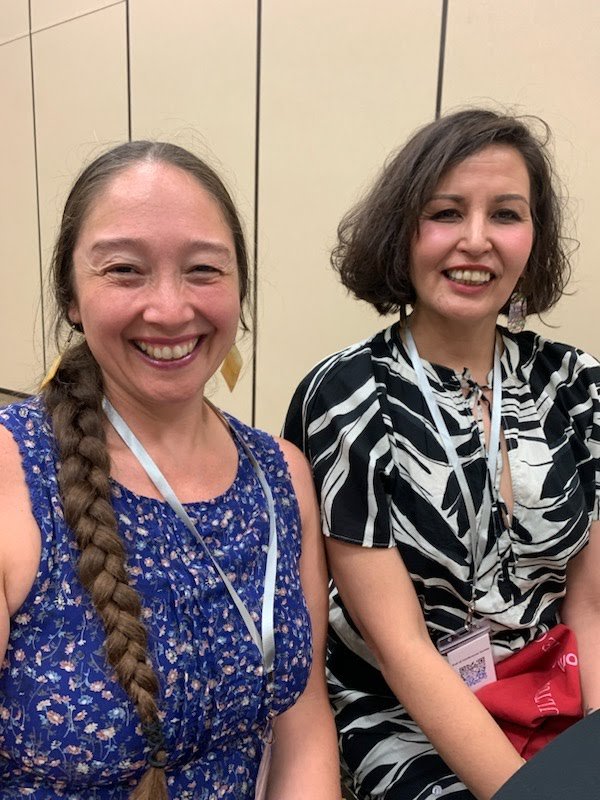

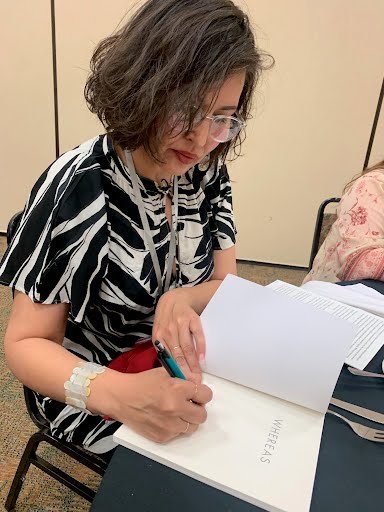
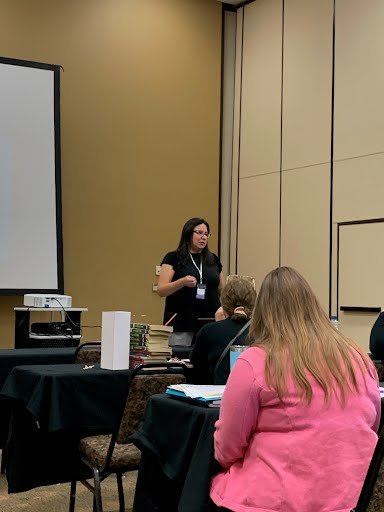
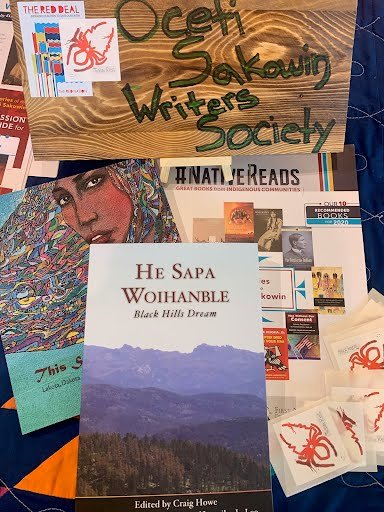
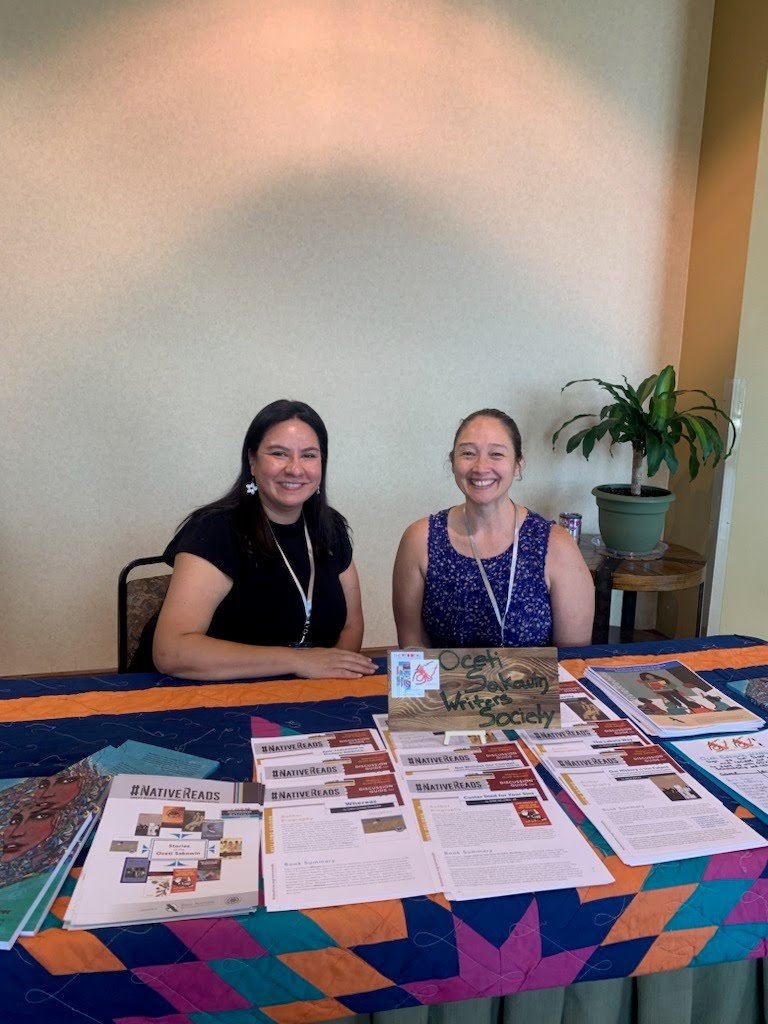
The Conference
The Oceti Sakowin Writers Society was invited to co-sponsor the South Dakota Council of Teachers of English (SDCTE), 2023 annual conference. The South Dakota Council of Teachers of English found a way to support historical accuracy using authentic indigenous voices, and toward’s that end, the Oceti Sakowin Writers Society was able to provide resources, a presence at the conference for questions and information, and contacts for future support.
Photos: Kateri Bird and Layli Long Soldier at SDCTE banquet; Layli’s autograph for Kateri; Layli autographing her book Whereas, OSWS Booth Close-up; Sarah Hernandez and Kateri Bird at OSWS’s booth at SDCTE conference; Sarah Hernandez teaching break-out session on the Oceti Sakowin Literary Tradition during the conference.
The conference was held at the Arrowwood Resort and Conference Center in Oacoma, SD, on June 14th and 15th, 2023. Located on the original lands of the Oceti Sakowin, we acknowledge our relatives at Crow Creek Sioux Tribe and Lower Brule Sioux Tribe who take care of the land and Mni sose still. The South Dakota Council of Teachers of English began in 1941 with the purpose to support, and encourage English teachers, while providing rigorous professional development opportunities that challenge growth and inclusivity within their content area.
Courage to face Challenging Conversations
Challenging current school politics and complicated history in South Dakota, SDCTE devoted this summer’s English Summer YOUniversity and Conference to understanding and facing this history. English teachers, being responsible for the material through which they teach critical and analytical thinking, research skills and writing technique, SDCTE strove to seek out and provide authentic experiences. The Oceti Sakowin Writers Society supported this endeavor with the knowledge and understandings collected within the members of the Societies literary works and a presentation by OSWS Board Treasurer, Professor Sarah Hernandez on the #NativeReads Native Reads | First Nations Development Institute project with OSWS as a community partner. She also shared information about the Oceti Sakowin Oyate Bibliography Project documenting over 200 writing resources. Attending teachers seemed relieved to have the book list, book summaries, specific discussion questions and especially looked forward to the podcasts, saying, “It will be powerful to have the Oceti Sakowin views and comments on the book in the voice of the people whose experience it represents.” Summer YOUniversity title this year is Methods for Using Literature to Teach Difficult History, focusing particularly on Oceti Sakowin authors and the stories from their lands.
Honoring awards were presented for Young Leaders of the year, for a new teacher within 5 yrs, a teacher of the Year award, and Author of the Year, Layli Long Soldier. Layli brought a calm Oceti Sakowin strength in her confident, humble words as she accepted her award, greeting her relatives in the language of her people, followed in English for non-native relatives. Layli began with a poem from her book Whereas (a #NativeReads selection) and continued with a small piece of her educational story, providing hope to those that seek alternative learning paths from high school, ending her talk with the hope and love of working as a writer and professor for poetry.
Topics outside English Class
These teachers have big hearts, and they addressed concerns outside of their content area with each other throughout the two days. These teachers are actively trying to problem-solve the situations of their students that follow them into the classroom. Issues and situations outside of their said English content area, yet which affect them in the classroom just the same. While content and teaching methods were priority, conversation topics were heard throughout the conference about student migration, student home life, challenges of lack of resources, lack of support from administration, students and parents, and safety. While struggling with balancing these concerns, the teachers were able to come together to laugh, offer support and gain information showing a special community for teachers to share, be vulnerable, and problem-solve together, bursting outside their own school silos, proving a strength of what they can do together.
Kateri Bird is a mom, kunsi (grandmother), Indigenous homeschool mom, with a B.A. from the University of Minnesota, Morris in Psychology and Anthropology and Masters in Tribal Administration and Governance from University of Minnesota, Duluth. She is a member of the Sisetuwon Wahpetuwon Dakota Oyate located in what is now South Dakota, where she lives, raises her children and continues to learn her Dakota language, traditional medicines and foods, history and culture, with the conversations of her relatives.
Road Musings: Supporting Native writers
Editor’s Note: Recently we asked OSWS member Diane Wilson to share with our readers why she contributes financially to the Society, and she was good enough to send us this dispatch from the road. Diane is not alone. Even though we don’t have membership dues, the Society’s individual donors are mostly our own members and other Native writers. We believe this fact speaks to the effectiveness of the Society’s work. Pilamiye, Diane! Toksa ake.
Han Mitakuyepi,
It has been a great honor to have my novel, The Seed Keeper, selected for the 2023 One Book South Dakota program, following Nick Estes’s book, Our History is the Future. As I wind up the first week of book events, these community conversations have reaffirmed the critically important work of the Oceti Sakowin Writers Society.
There is a widespread lack of understanding about Oceti Sakowin history and culture and the invaluable contributions of Native writers. The #NativeReads book list compiled by OSWS is an extremely important educational resource, especially as South Dakota standards have limited the teaching of Oceti Sakowin history (thank you to fellow OSWS member, Sarah Hernandez, for calling this out in your book, We Are The Stars.)
For more than 30 years, the OSWS has supported Native writers, ensuring that our voices continue to be heard. Sharing these stories actively resists efforts to repress Native history and supports our oral tradition in preserving our culture for future generations.
Please join me in making a donation today! Whatever you can afford will help the OSWS continue to provide essential support to Native writers.
Pidamayaye!
Diane Wilson
Mdewakanton/Sicangu
Weather impacts LNEC/LNI attendance
Due to weather and health reasons, OLWS will not officially be participating in the Lakota Nations Education Conference at the Ramkota this week during Lakota Nations Invitational.
However, the Saturday open-mic event during the Sandcreek Art Fair by organizers of LNEC will still be held. OLWS members who are able to be there are still invited to participate. Please see the flyer below for who to contact.
Spectres, Specs and Sex: A recap of the annual Oceti Sakowin Writers' Retreat
2022 Oak Lake Writers’ Society Retreat group photo for the night of the Community Read. Back row: Lanniko Lee (Cheyenne River Sioux Tribe), Kim Tallbear (Sisseton-Wahpeton Sioux Tribe), Taté Walker (Cheyenne River Sioux Tribe), Mark K. Tilsen (Oglala Sioux Tribe), Mabel Picotte (Yankton Sioux Tribe), Evangeline Picotte (youth), Nick Estes (Lower Brule Sioux Tribe), Peggy Peters (Sisseton-Wahpeton Sioux Tribe), Christopher Pexa (Spirit Lake Dakota Nation), Kateri Bird (Sisseton-Wahpeton Sioux Tribe). Front row: Sarah Hernandez (Rosebud Sioux Tribe), Jessica Garcia-Fritz (Cheyenne River Sioux Tribe), Christopher Bordeaux (Rosebud Sioux Tribe), Tasiyagnunpa Livermont Barondeau (Oglala Sioux Tribe), Abbigail Young (youth), and Samuel Bird (youth). Not pictured: Edward Valandra (Rosebud Sioux Tribe), Patty Bordeaux Nelson (Rosebud Sioux Tribe), Agnes Picotte (Yankton Sioux Tribe), and Vi Waln (Rosebud Sioux Tribe).
Twenty-one established and emerging D/N/Lakota writers convened at the Golden Buffalo Casino in Lower Brule from November 3-6, 2022.
Attendees represented a wide range of genres and backgrounds. Through the sessions and free time, as well as a short annual meeting, writers shared stories and writing in an Oceti Sakowin-centered space.
Our OLWS Community Read offered a fun exchange of writing. We might be the only group that gets equally excited about saucy poetry as it does about architectural specifications of settler colonialism. And ghost stories (off camera).
Learning from one another is always a huge part of the Oak Lake Writers’ Society retreats, and this year was no different. Discussion of recent events and issues in our communities provided inspiration for new and ongoing pieces of writing by those in attendance. We also had Lower Brule Sioux Tribe guests, Lower Brule Sioux Tribe President Clyde J.R. Estes and Lewis Grassrope, stop by to share their community’s history and current issues. A new Society anthology is now also in the works.
For those of us in the trenches the last few years, the energy and commitment of attendees at the retreat gave us great satisfaction that our work has been successful. We also know we have important work to continue to do.
Several new board members are also ready to onboard at the next meeting, as we make our first successful board member rotation transition. We are so grateful for the amazing board members who have served thus far.
We are also grateful for the staff at the Golden Buffalo Casino for their generous hospitality. In an area that hasn’t rebounded fully since Covid-19, us writers felt good that our non-profit dollars were going to support one of our own Oceti Sakowin communities. Despite hosting a larger gathering than we have seen in many years, we didn’t spend beyond previous year’s budgets. This was a concern considering we moved to a convention/hotel room retreat experience this year instead of the Oak Lake Field Station lodge.
Next year’s retreat date will be September 7-10, 2023. The place is officially TBD, though we would like to gather in He Sapa.
Huge thank you to our donors who made this year’s retreat and other events and staffing possible!
Watch our Community Read below!
Pre-order We Are The Stars by OLWS member Sarah Hernandez, Ph.D.
Author: Sarah Hernandez, Ph.D., (Rosebud Sioux Tribe), Oak Lake Writers’ Society member
After centuries of colonization, this important new work recovers the literary record of Oceti Sakowin (historically known to some as the Sioux Nation) women, who served as their tribes’ traditional culture keepers and culture bearers. In so doing, it furthers discussions about settler colonialism, literature, nationalism, and gender.
Women and land form the core themes of the book, which brings tribal and settler colonial narratives into comparative analysis. Divided into two parts, the first section of the work explores how settler colonizers used the printing press and boarding schools to displace Oceti Sakowin women as traditional culture keepers and culture bearers with the goal of internally and externally colonizing the Dakota, Nakota, and Lakota nations. The second section focuses on decolonization and explores how contemporary Oceti Sakowin writers and scholars have started to reclaim Dakota, Nakota, and Lakota literatures to decolonize and heal their families, communities, and nations.
1894 Sioux Treaty Council responds to Biden, Indigenous Peoples Day proclamation
Statement on Biden’s Proclamation on Indigenous Peoples Day 2022 by the 1894 Sioux Nation Treaty Council established by He Dog
Shared at the request of Charmaine White Face, OLWS contributing writer to He Sapa Woihanble: Black Hills Dream
Oct. 12, 2022
To: U.S. President Joe Biden The White House Washington DC 20500
From: The 1894 Sioux Nation Treaty Council established by He Dog Post Office Box 2003 Rapid City, SD 57709
Re: A Proclamation on Indigenous Peoples Day 2022
Dear Mr. Biden,
When reading your Proclamation regarding Indigenous Peoples, for a second there was a spark of hope that this time we might be free. Then we read on and cold water was poured on that spark of hope when you continued with words that refer only to the "Tribes" your government created in the Wheeler-Howard Act of 1934. It was also called the Indian Reorganization Act (IRA) and means the "tribal governments" that Act created without our consent. This is a major Human Rights violation.
However, as an elder in the family of nations trying to teach your young nation, the United States (US), the essence of Human Rights, we are sending you this letter. Remember, your colonizing government is only a little over 200 years old. We have a civilization that is more than ten-thousand years old and know a few things about Human Rights.
One of the first rules is to keep your word. In the Fort Laramie Treaty of 1868 which the United States signed with us, and which was ratified by your government, Article II promised that the 1868 Fort Laramie Treaty Territory would be for our “...absolute and undisturbed use and occupation." However, in order to reach the gold and other resources in our Territory, your government totally destroyed our economy (the bison) and put us in Prisoner-of-War camps which now are called American Indian Reservations.
Your government gave their word and honor to our Nation in the Fort Laramie Treaty of 1868. In your Proclamation you said, "...we recommit to upholding our (US) solemn trust and treaty responsibilities...". If this is true, and truly meant for our nation who signed the Treaty, not the "tribes" created by your government, then we recommend that your government follow the United Nations Decolonization procedure for returning our land and reinvigorating our form of government. This would be true Self-Determination which we had for millennia before the invasion and occupation by your government.
It is nice that you have Ms. Haaland on your Cabinet and other Indigenous people in government positions, but that does not in any way answer the Human Rights violations your government continues to impose on our Nation. Your IRA Tribal governments are only puppet governments bending to your will and used to impose your will on our Nation. Your billions of dollars can never pay for one Human Rights violation your government inflicts on us today. Shall we start with the illegal trespass of your citizens into our Treaty Territory or the numerous children that are still being stolen by your Social Services Departments?
We are taking you at your word that you mean what you say, '...we recommit to upholding our solemn trust and treaty responsibilities...". We are sending a copy of this letter to the United Nations Secretary General, the members of the General Assembly, the Decolonization Committee, the High Commissioner for Human Rights, and the Human Rights Council so that they can also know your words and your intentions.
Our being free in our 1868 Treaty Territory in no way resembles "secession" as we cannot secede from something of which we were never apart. We are our own Nation with an International Treaty with your nation, the United States. The 1894 Sioux Nation Treaty Council was established long before the 1935 U. S. Indian Reorganization Act which established tribal governments. We are not a tribe. We are a Nation.
We pray that you will keep your word, honor and intention and truly uphold and enforce the entire 1868 Fort Laramie Treaty. If you do so, we will finally be liberated and free after more than one-hundred and fifty years under your illegal invasion and occupation.
Respectfully submitted by
Zumila Wobaga, Itancan
and Charmaine White Face, Spokesperson
1894 Sioux Nation Treaty Council
www. siouxnationtreatycouncil. org
October 07, 2022 A Proclamation on Indigenous Peoples'Day, 2022
On Indigenous Peoples'Day, we honor the sovereignty, resilience, and immense contributions that Native Americans have made to the world; and we recommit to upholding our solemn trust and treaty responsibilities to Tribal Nations, strengthening our Nation-toNation ties. For centuries, Indigenous Peoples were forcibly removed from ancestral lands, displaced, assimilated, and banned from worshiping or performing many sacred ceremonies. Yet today, they remain some of our greatest environmental stewards. They maintain strong religious beliefs that still feed the soul of our Nation. And they have chosen to serve in the United States Armed Forces at a higher rate than any other group. Native peoples challenge us to confront our past and do better, and their contributions to scholarship, law, the arts, public service, and more continue to guide us forward. I learned long ago that Tribal Nations do better when they make their own decisions. That is why my Administration has made respect for Tribal sovereignty and meaningful consultation with Tribal Nations the cornerstone of our engagement and why I was proud to restore the White House Council on Native American Affairs. To elevate Indigenous voices across our Government,I appointed Deb Haaland as Secretary of the Interior, the first Native American to serve as a cabinet secretary, along with more than 50 other Native Americans now in significant roles across the executive branch. My Administration is also directly delivering for Native communities - creating jobs, providing critical services, and restoring and preserving sacred Tribal lands. We have made the biggest investment in Indian Country in history, securing billions for pandemic recovery, infrastructural improvements, and climate change resilience, and we are working together with Tribal Nations to end the scourge of violence against Indigenous women and girls. These efforts are a matter of dignity, justice, and good faith. But we have more to do to heip lift Tribal communities from the shadow of our broken promises, to protect their right to vote, and to help them access other opportunities that their ancestors were long denied. On Indigenous Peoples'Day, we ceiebrate indigenous history and our new beginning together, honoring Native Americans for shaping the contours of this country since time immemorial.
NOW THEREFORE, I, JOSEPH R. BIDEN JR., President of the United States of America, do hereby proclaim October 1O,2A22, as Indigenous Peoples' Day. I call upCIn the people of the United States to observe this day with appropriate ceremonies and activities" I also direct that the flag of the United States be displayed on all public buildings on the appointed day in honor of our diverse history and the Indigenous peoples who contribute to shaping this Nation. IN WITNESS WHEREOE I have hereunto set my hand this seventh day of OctobeE in the year of our Lord two thousand twenty-two, and of the Independence of the United States of America the two hundred and farty-seventh.
JOSEPH R. BIDEN JR.
2022 Annual Writers' Retreat General Registration open!
For our first in-person annual writers’ retreat since Covid-19 and since becoming a 501(c)3 non-profit, the Oak Lake Writers’ Society invites you to the Mnisose (Missouri River). The retreat will take place at the Golden Buffalo Casino, Motel and Convention Center in Lower Brule, the current homelands of the Kul Wicasa and Lower Brule Sioux Tribe.
This year’s format for the annual writers’ retreat organized by the Oak Lake Writers’ Society will feature good food, storytelling and discussions, guided writing critiques in a group setting, a field trip, a community reading, plus plenty of time for writers to simply write.
For more information and to register, please visit the 2022 Annual Retreat page on our website. While you don’t have to be a member of the Oak Lake Writers’ Society to attend the retreat, you do need to be an enrolled member or Canadian status card carrier from one of the fires of the Oceti Sakowin Oyate.
The registration fee, hotel, food and lodging are provided for by the Oak Lake Writers’ Society. Since becoming a 501(c)3, some of our writers make their own contributions. You may donate here. Transportation is up to the attendees, though we may have some mileage reimbursement funds available. If transportation is an issue please indicate so on your registration form and if you would like mileage reimbursement. If you do not need mileage reimbursement, please also indicate that so we can get funds to those who could most benefit. More information is in the registration form.
Toksa ake!
Nick Estes, 2022 One Book South Dakota, Livestream
In wrapping up the 2022 One Book South Dakota program, on September 23, 2022, Nick Estes, Ph.D., (Kul Wicasa/Lower Brule) gave the Friday night address at Festival of Books. His book, Our History is the Future, was the #NativeReads 2019 selection and the One Book South Dakota for 2022. Watch online via the South Dakota Humanities Council’s Facebook Livestream. You shouldn’t need Facebook to be able to watch.
For more information about, ‘Our History is the Future,’ please visit the #NativeReads page as the lead selection for this project in 2019.
#NativeReads livestream from Festival of Books
The Oak Lake Writers’ Society would like to thank the South Dakota Humanities Council for livestreaming several panels of the Society and readings by our members. Please click here to watch the #NativeReads Livestream.
Just before Covid-19 pandemic, the First Nations Development Institute partnered with the Oak Lake Writers’ Society (Society) to increase knowledge of and appreciation for Oceti Sakowin (Dakota, Lakota and Nakota) literatures. Because of the devastating effects of colonization and the government and church boarding schools, few people recognize that the Oceti Sakowin have our own rich and complex literary traditions. In 2019, the Society compiled a list of nearly 200 books by Dakota, Lakota, and Nakota writers that disprove and challenge this false assumption.
You can learn more about #NativeReads on our website.
Oak Lake Writers at Festival of Books this weekend
The members of the Oak Lake Writers’ Society invite you to join us at the Festival of Books by the South Dakota Humanities Council, this week, Thursday, September 22, 2022, through Sunday, September 25, 2022 in Brookings, South Dakota.
With the selection of Our History is the Future by OLWS Member and current Board Member Dr. Nick Estes (Kul Wicasa/Lower Brule) as the South Dakota Humanities Council One Book South Dakota, also the lead selection for #NativeReads, as well as the second printing of the OLWS anthology This Stretch of the River, the work of the Oak Lake Writers’ Society will be widely available to Festival attendees.
Panels, discussions and our exhibitor table will feature the collaborative work of the Oak Lake Writers’ Society, as well as the work of almost a dozen of our members and event participants. They include Lanniko Lee, Lydia Whirlwind Soldier, Gabrielle Tateyuskanskan, Dr. Craig Howe, Joel Waters, Dr. Sarah Hernandez, Dr. Nick Estes, Mabel Picotte, Diane Wilson, Taté Walker, Patty Bordeaux Nelson, and Tasiyagnunpa Barondeau. (Joseph Marshall III will not be attending the Festival due to health.) A previous inter-tribal retreat mentor Gordon Henry will also be presenting.
For the most up-to-date schedule, please visit the South Dakota Humanities Council. Gmail users can also subscribe to the Oak Lake Writers’ Society Public Events Google Calendar. Events are also listed below. All events are free and open to the public unless otherwise indicated.
Don’t forget to look for our table in the Exhibitor Area at the Oscar Larson Performing Arts Center to sign-up for door prizes and additional author signings by our members. OLWS anthologies and other books will be available for purchase at the table in collaboration with CAIRNS (Center for American Indian Research and Native Studies) and Dr. Craig Howe (Oglala Lakota).
OLWS Public Events at Festival of Books
Thursday, September 22
Special Event: Festival of Books Author Reception
(Confirmed OLWS authors include Taté Walker.)
Good Roots Farm & Gardens 3712 Medary Ave, 6:30-8:30 p.m.
Price: $50 (Click here to purchase a ticket.)
Friday, September 23
Reflections on the Rerelease of This Stretch of the River - Craig Howe, Lydia Whirlwind Soldier, Lanniko Lee, Gabrielle Tateyuskanskan, Joel Waters - Moderated by Nick Estes
1:30 p.m.-2:15 p.m.
Oscar Larson Performing Arts Center
Room: Founders Recital Hall
A Reading of New and In-Progress Work by Members of the Oak Lake Writers Society
5:30-6:15 p.m. (We will dismiss at 6 p.m. to go over to Nick Estes’s One Book keynote)
Oscar Larson Performing Arts Center
Room: Multi-Use Rehearsal South (195A)
Our History Is the Future: Taking Inspiration from Indigenous Movements - Nick Estes
One Book South Dakota Address
6:30 p.m.-7:20 p.m.
Oscar Larson Performing Arts Center
Room: Larson Memorial Concert Hall
(This event will also be live-streamed at the SDHC Facebook Page.)
Saturday, September 24
“The Gift”: Centering Lakotan Narratives & Artworks in Educational Exhibits - Craig Howe
10-10:45 a.m.
SDSU American Indian Student Center
The Seed Keeper: A Reading and Discussion - Diane Wilson
11-11:45 a.m.
SDSU American Indian Student Center
The Trickster Writes: Poetry Rooted in Culture - Tate Walker
1-1:45 p.m.
Oscar Larson Performing Arts Center
Room: Classroom 109
Writing Relations: Authenticity in Native Literature - Gordon Henry & Devon Mihesuah
1-1:45 p.m.
Oscar Larson Performing Arts Center
Room: Multi-Use Rehearsal North (193A) or online at the SDHC Facebook Page
Survival Songs: A Poetry Reading - Lydia Whirlwind Soldier
2-2:45 p.m.
Oscar Larson Performing Arts Center
Room: Classroom 109
#NativeReads: Great Reads from Indigenous Communities - Lanniko Lee, Gabrielle Tateyuskanskan, Joel Waters, Patty Bordeaux Nelson and Tasiyagnunpa Barondeau - Moderated by Dr. Sarah Hernandez
3-3:45 p.m.
Oscar Larson Performing Arts Center
Room: Founders Recital Hall or online at the SDHC Facebook Page
Sunday, September 25
Keeping Seeds, Restoring Gardens, Writing Culture - Devon Mihesuah & Diane Wilson in Conversation with Tasiyagnunpa Barondeau
11-11:45 a.m.
McCrory Gardens
Thank you to the South Dakota Humanities Council for their collaboration in making this an excellent event for OLWS members and all of the many readers and writers attending the Festival of the Book. An additional thank you to the Brookings Reconciliation Council for contributing to travel and accommodation costs for some of our members and panelists. Thank you to all the many volunteers who make this Festival a success.
Sisseton-Wahpeton College's new dorm named for Elden Lawrence, Dakota writer and educator
At the invitation of his children, South Dakota State University and Oak Lake Writers’ Society colleagues of Dr. Elden Lawrence attend the Sisseton-Wahpeton College dedication of a dorm named in his honor. Left to Right: Dr. Nels Granholm, Retired SDSU professor, Derick Lawrence, son, Debbie Lawrence, daughter, Dr. Charles Woodard, Retired SDSU professor, friend and co-creator of the Oak Lake Writers’ Society, and Tasiyagnunpa Barondeau, executive director of the Oak Lake Writers’ Society.
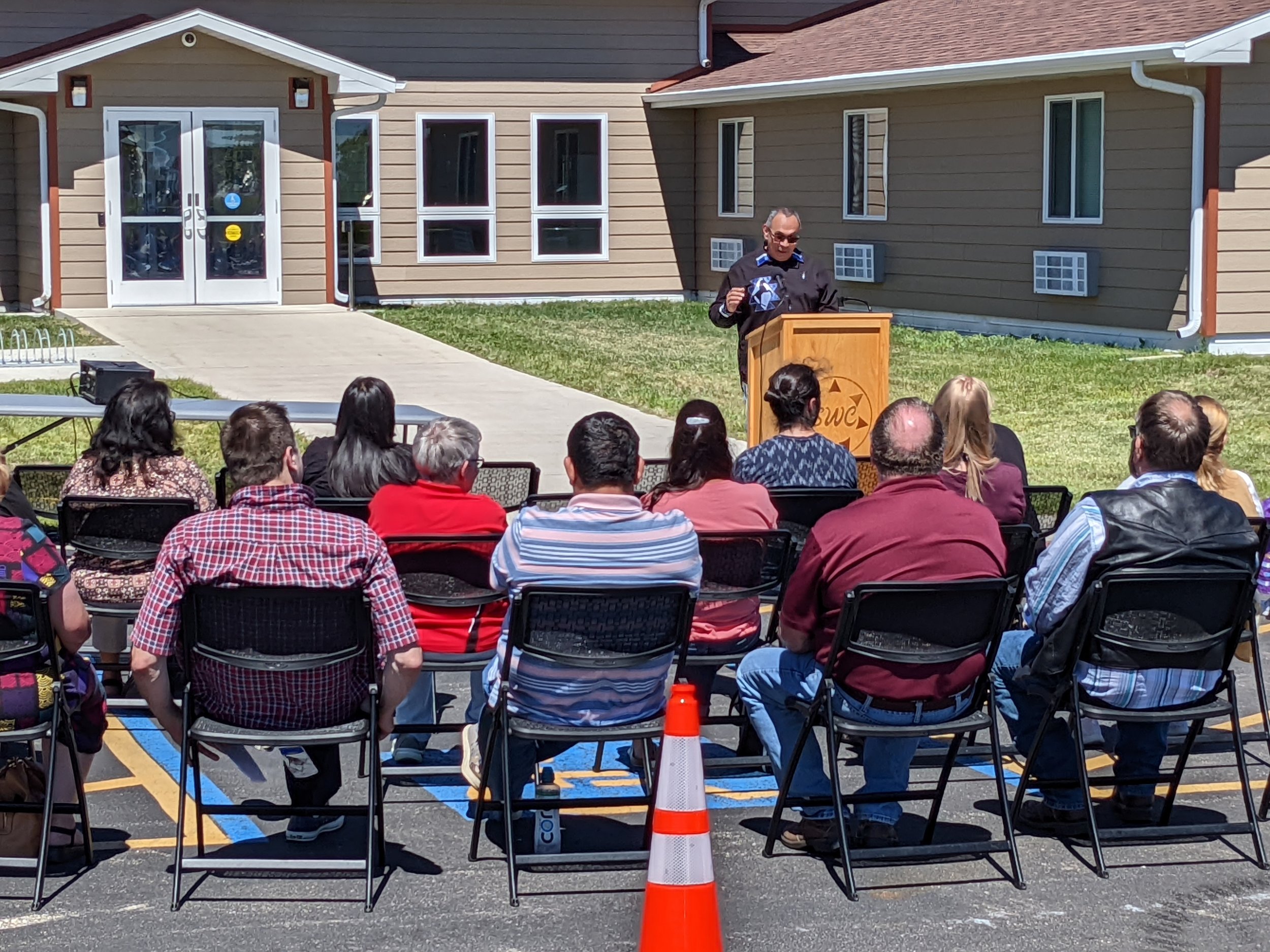
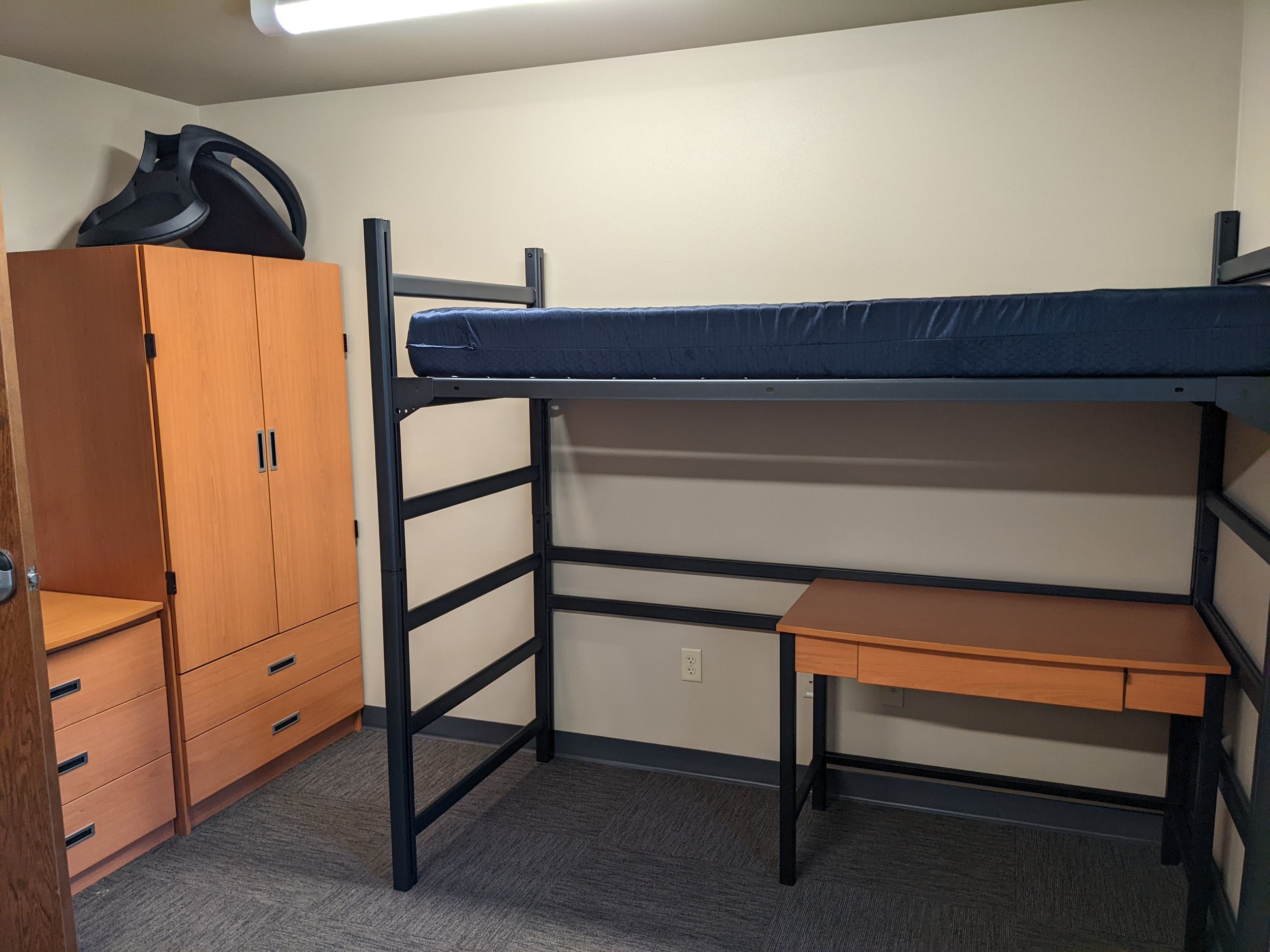
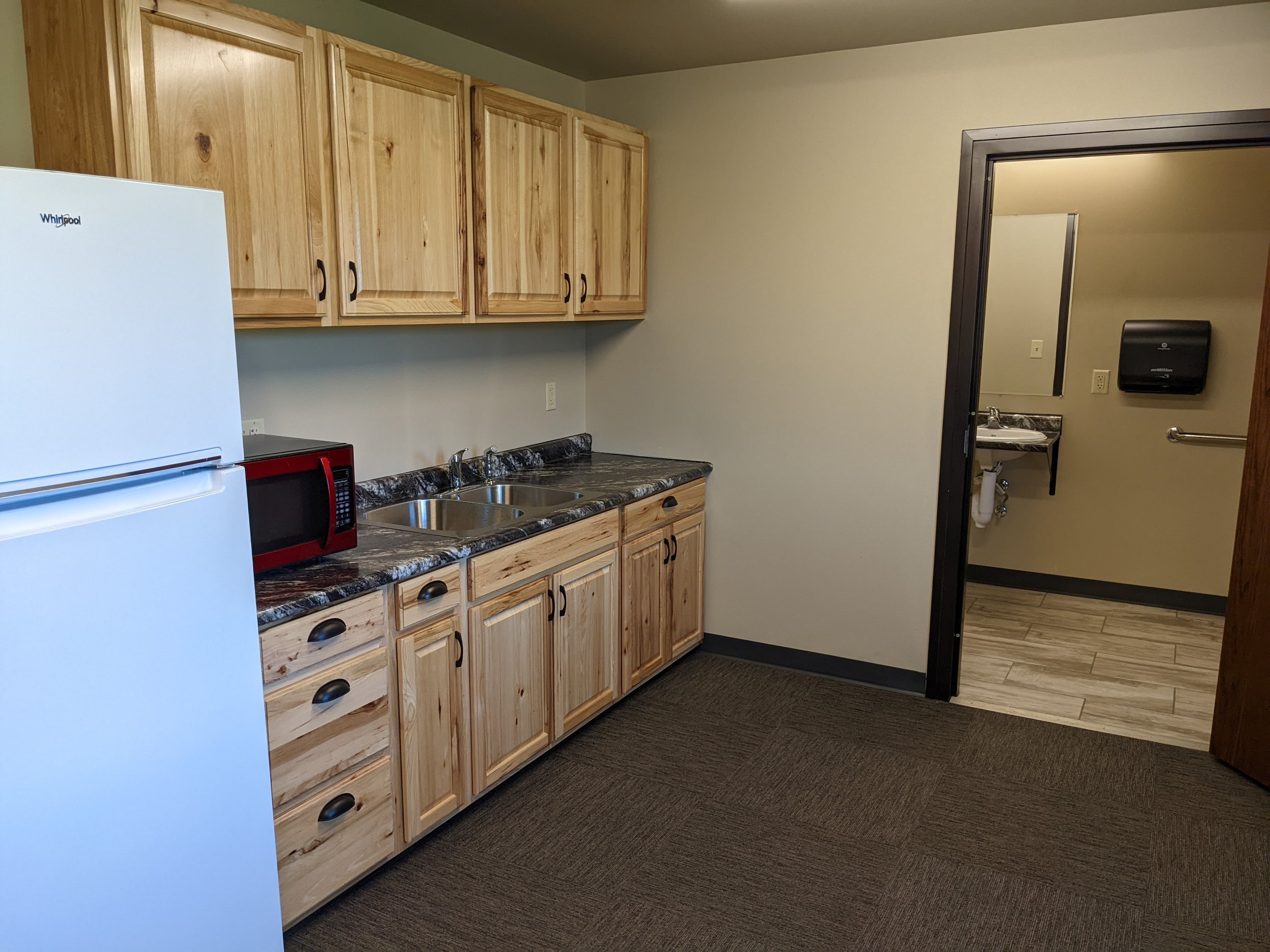
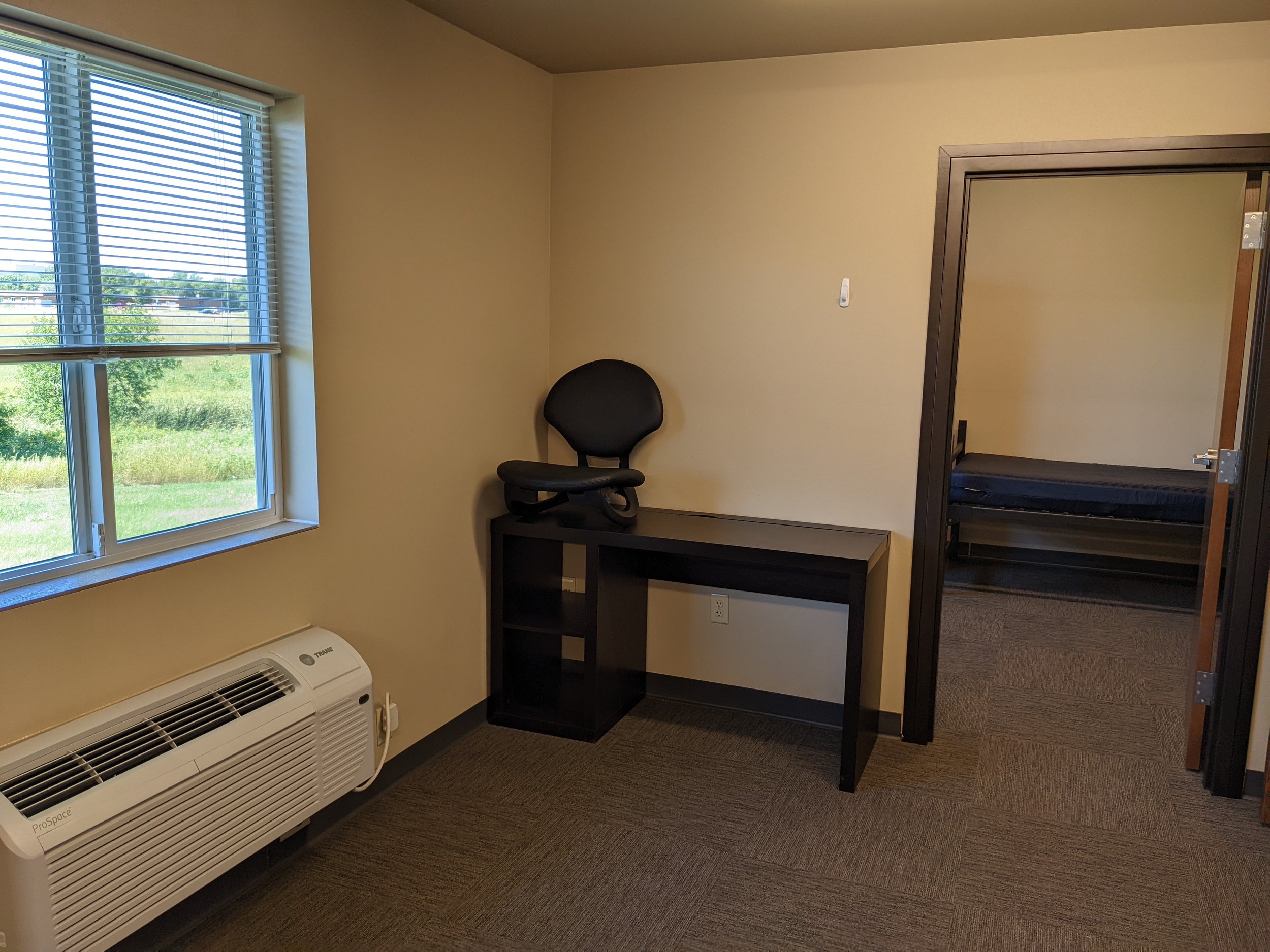
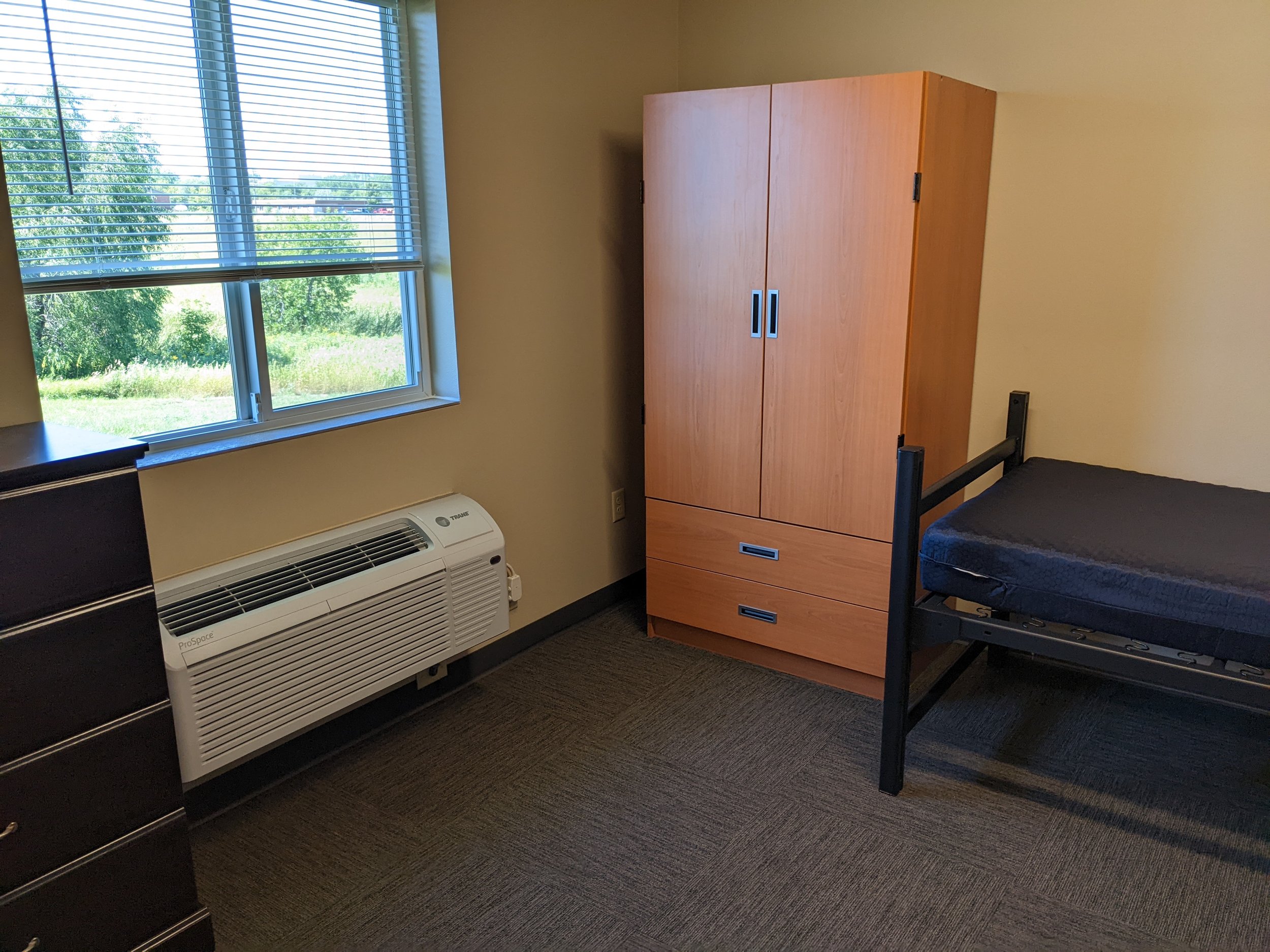
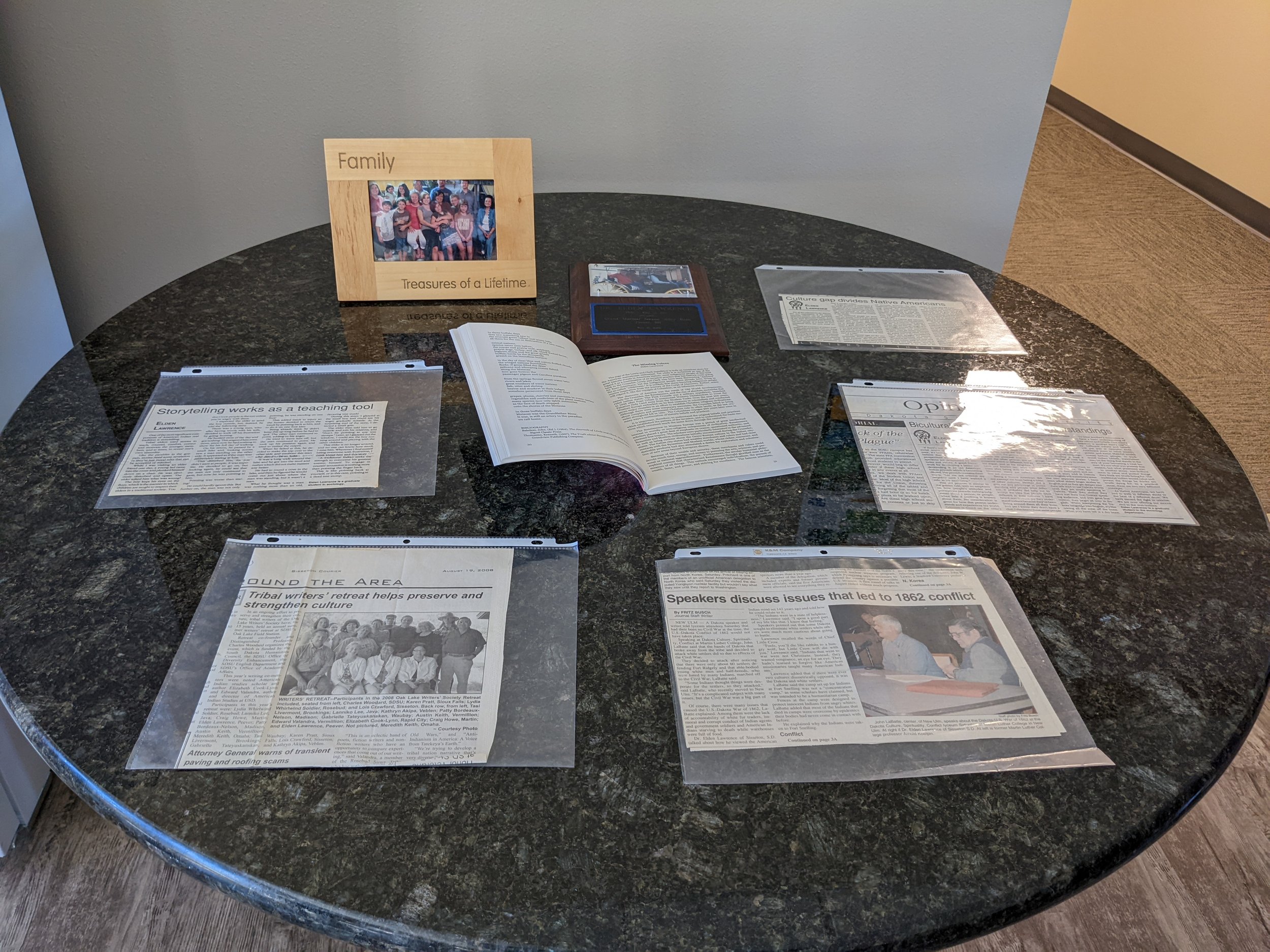
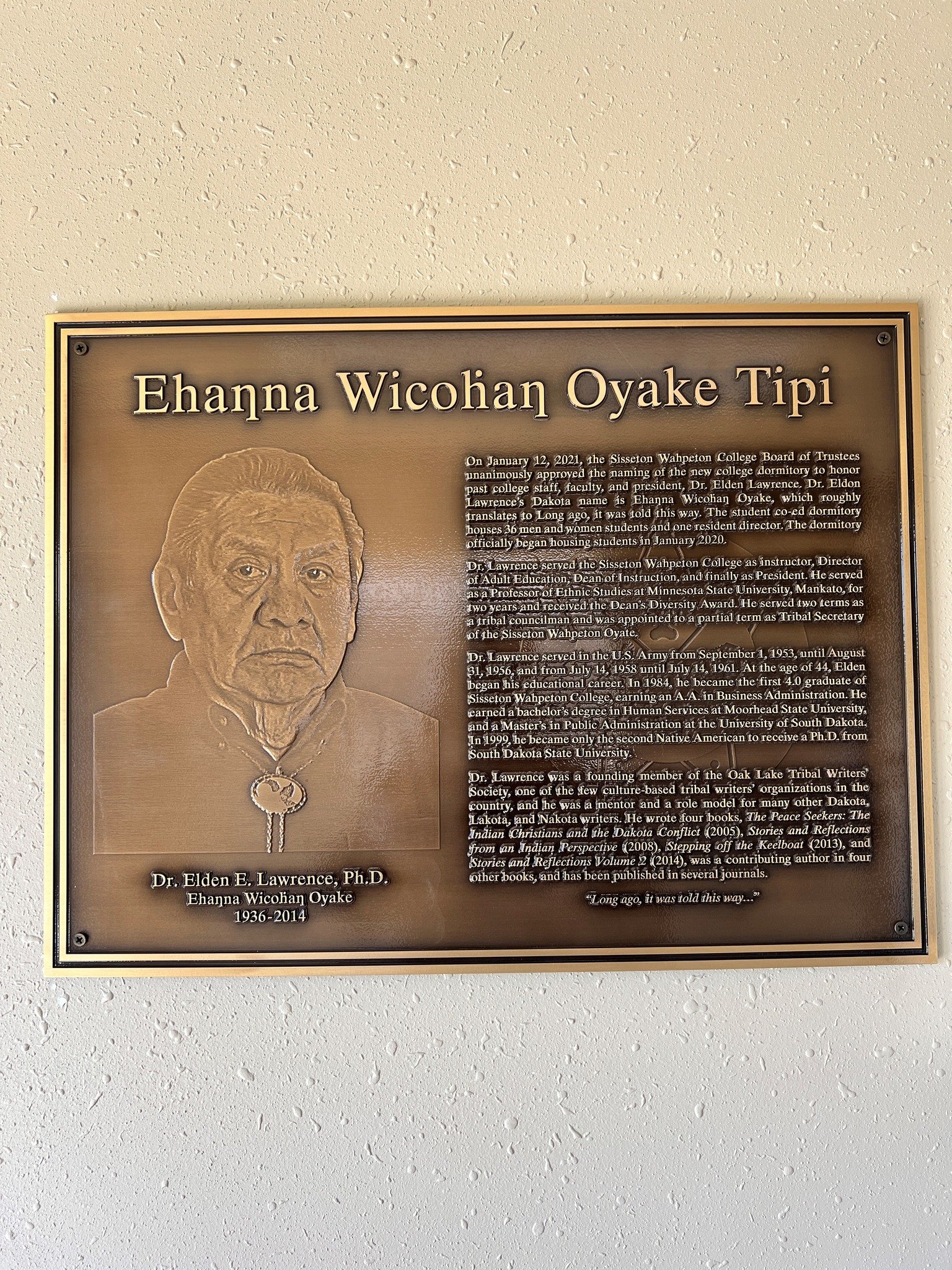
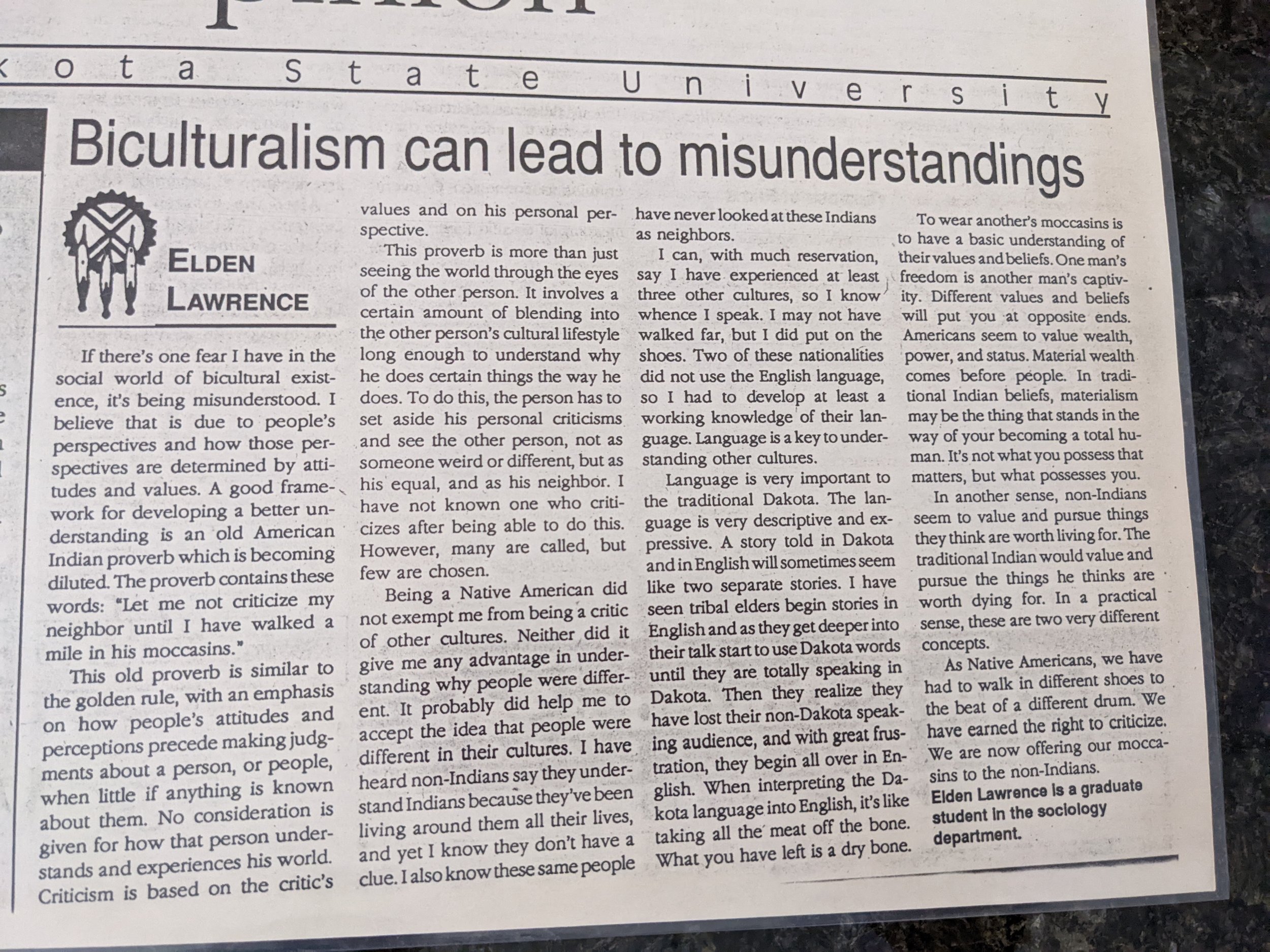
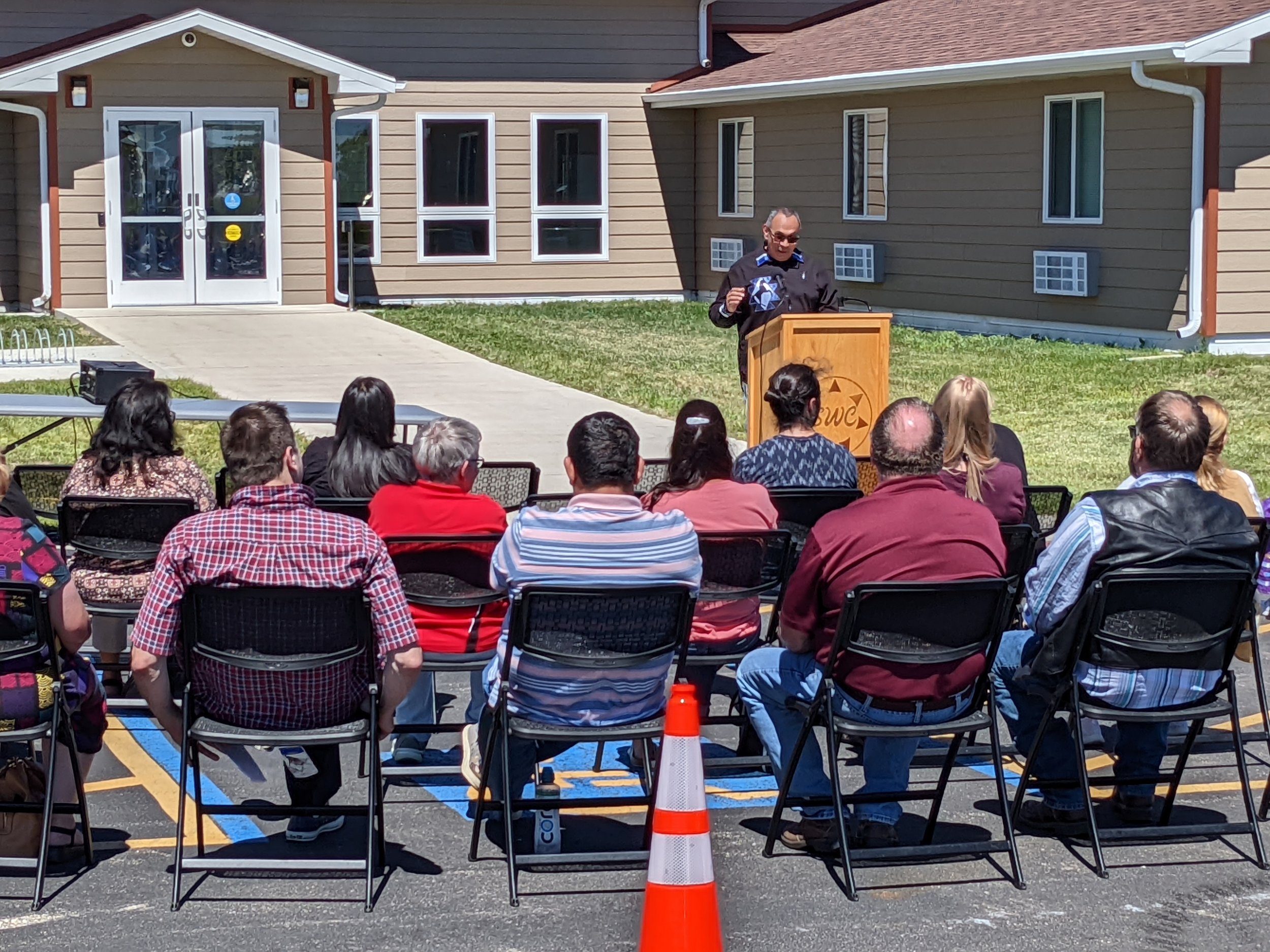
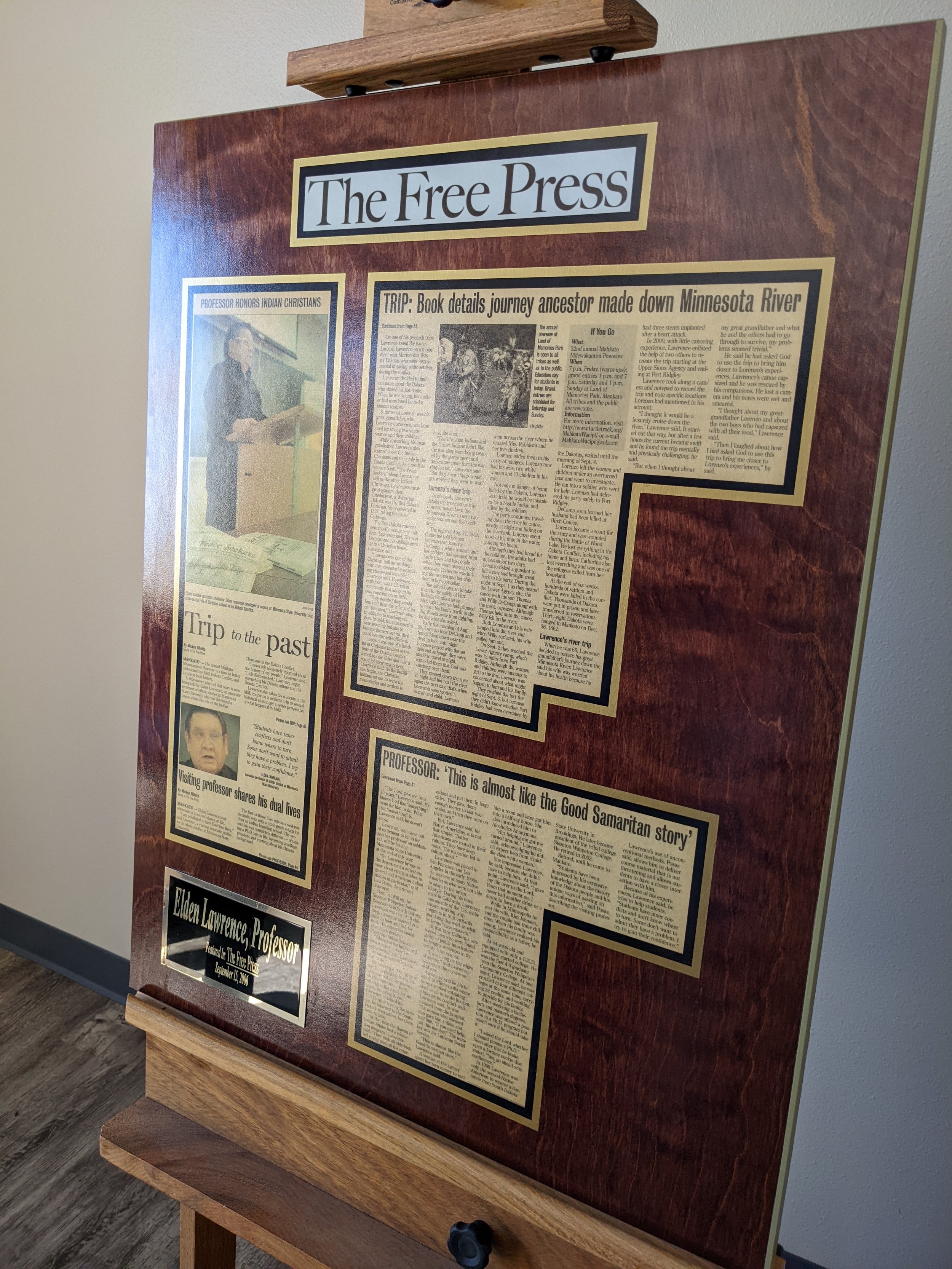
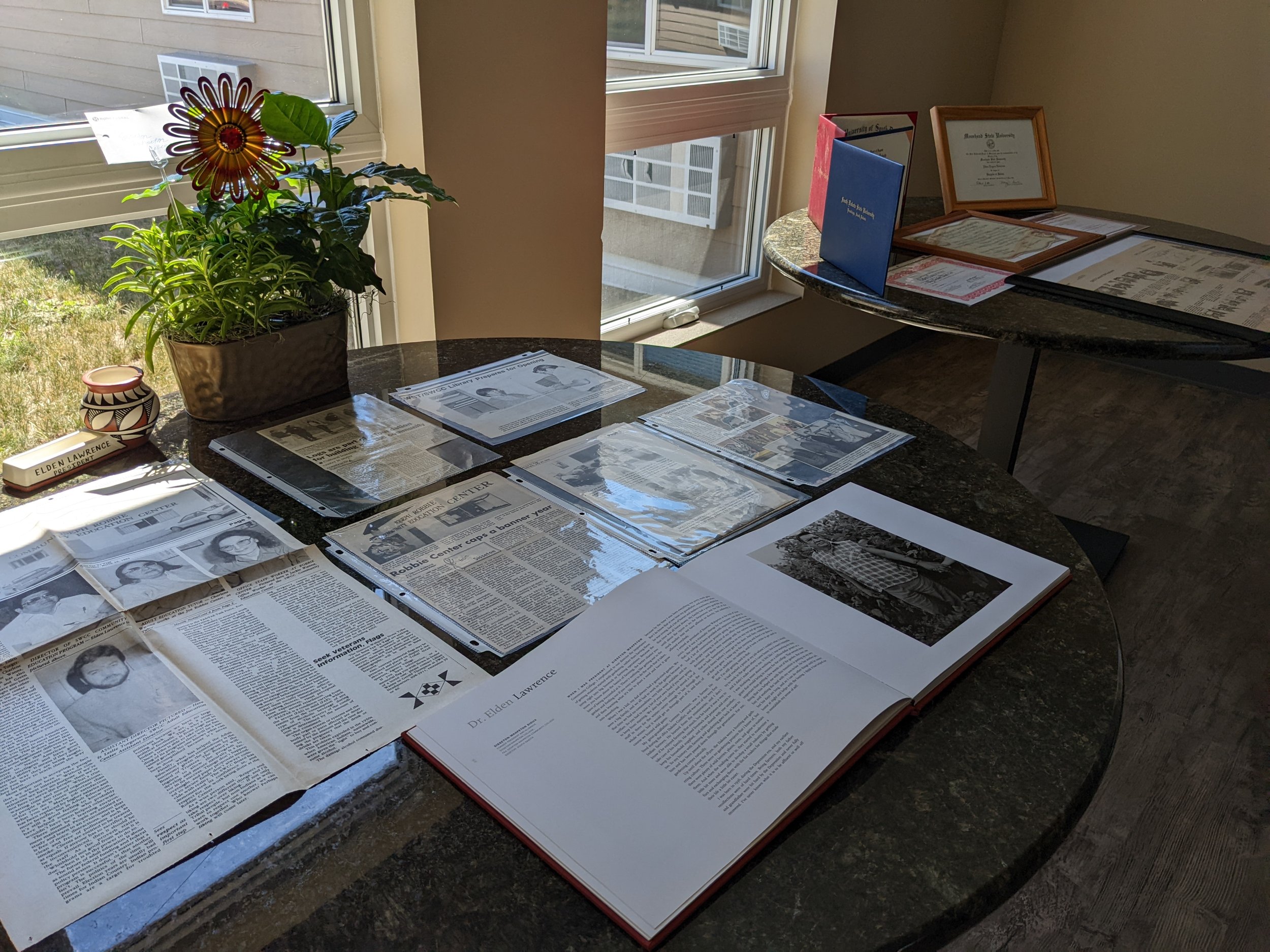
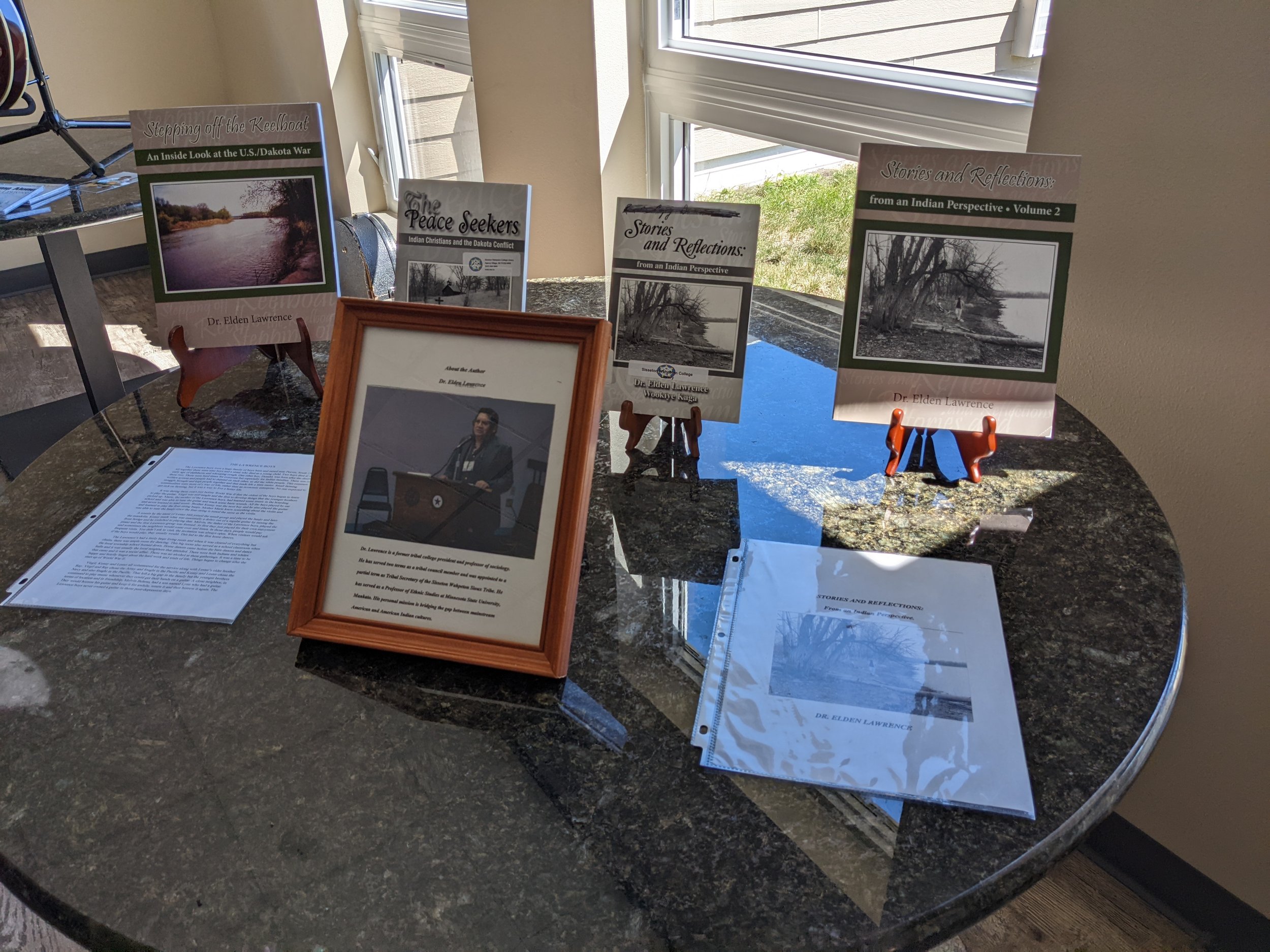
Elden Lawrence shares during the 2008 Oak Lake Writers’ Retreat.
On Tuesday, August 9, 2022, the Sisseton-Wahpeton College dedicated the Ehanna Wicohan Oyake Tipi, the new co-ed student dormitory that began serving students in 2020.
The dorm is named in memory of Dr. Elden Lawrence, member of the Sisseton-Wahpeton Oyate, whose Dakota name was ‘Ehanna Wicohan Oyake.’ According to the plaque at the entrance of the dorm, the rough English translation of his Dakota name is ‘Long ago, it was told this way…’
The dedication program featured moving tributes from friends, colleagues, his children and those who didn’t know him personally but have been inspired and moved by Lawrence’s spirit of education and service.
A Dakota Christian prayer was offered, as well as an Honor Song. An open house in the dorms followed and featured cake and memorabilia showcasing Lawrence’s career and gifts of writing, education, administration, and celebrated guitar playing. The naming and program was a fitting tribute to a gifted storyteller and educator.
Lawrence began his life of service in the US Army from 1953-1956 and 1958-1961, where he earned his GED and received several medals of recognition. Upon his return, he traveled the country working and arrived in Minneapolis where he met his wife Kim Johnson. They married in 1969, eventually returning to South Dakota, and began their family, which would include one son, Derrick, and one daughter, Debbie.
At the age of 44, Lawrence embarked on the next leg of his educational journey, seeking an academic career as a family man intent on providing a better and more stable life for his family. He earned his Associate’s Degree in Business Administration from Sisseton-Wahpeton College, his bachelor’s degree in Human Services from Moorhead State University, his master’s degree in Public Administration from the University of South Dakota, and in 1999 received his Ph.D. from South Dakota State University.
He would go on to serve on the Sisseton-Wahpeton Tribal Council and the Sisseton-Wahpeton College in various capacities as council man, instructor, administrator, and SWC President and SWTC Secretary.
A Dakota Christian, Lawrence’s writing, music and service was respected as someone who followed Jesus and let that journey, especially through his education and writing, shed light on the atrocities committed by the American government and churches against his people. A peace seeker, he wrote unflinchingly as a good Dakota relative and mentored, educated and encouraged the next generation to do likewise.
In addition to columns and academic journals, Lawrence also wrote four books, The Peace Seekers: The Indian Christians and the Dakota Conflict (2005), Stories and Reflections From an Indian Perspective (2008), Stepping Off the Keelboat (2013), and Stories and Reflections From an Indian Perspective, Volume 2 (2014). He was a contributing author in four other books, including the Oak Lake Writers’ Society anthologies, This Stretch of the River (2006), and He Sapa Woihanble (2011).
A founding member of the Oak Lake Writers’ Society in the 1990s, Lawrence’s attention to history and the stories that have not been told continue to shape the vision of the Oak Lake Writers’ Society today. In attendance from the Oak Lake Writers’ Society and community was Dr. Charles Woodard, long-time friend and colleague, Dr. Nels Granholm, colleague, and Tasiyagnunpa Livermont Barondeau, executive director of the Oak Lake Writers’ Society and a mentee of Lawrence’s during several OLWS Annual Writers’ Retreats.
Due to Covid-19, the dedication was two years in the making. Lawrence died July 4, 2014.
Plaque photo and Facebook video courtesy of Sisseton-Wahpeton College. All other photos by Tasiyagnunpa Barondeau.
Estes One Book South Dakota kick-off in Sisseton
Nick Estes’s One Book South Dakota KICK-OFF begins in Sisseton
Wednesday, July 20, Sisseton 5:30 p.m. – Sisseton Wahpeton College (Rooftop of Vocational Education Building, or SWC Library in case of inclement weather), 12572 BIA Road 700. For more information, contact coordinator Delphine Hagel, 605-742-1104
Thursday, July 21, Aberdeen 7 p.m. – K.O. Lee Aberdeen Public Library, 215 Southeast 4th Ave. For more information, contact coordinator Cara Perrion, 605-626-7097
You’re invited! Part of the mission of the Oak Lake Writers’ Society is to support the efforts of our members before, during, and after the writing process. Please attend if possible.
Photo courtesy of South Dakota Humanities Council
Nick Estes (Lower Brule Sioux Tribe), Ph.D., is a scholar of American Indian studies currently teaching in the Department of American Indian Studies at the University of Minnesota, activist for social justice, co-founder of Red Nation and Red Media, and member of the Oak Lake Writers’ Society, also serving as an OLWS Board Member.
Thank you to the South Dakota Humanities Council for recognizing the outstanding work of this tribal writer and working with OLWS to spread the word and provide materials.
For more information about One Book South Dakota and Nick’s tour, please visit the South Dakota Humanities Council blog.
OLWS gains IRS non-profit status
Reorganizing business meeting of the Oak Lake Writers Society in Pierre, SD, on October 20, 2018. Members in attendance (left to right, back row) Edward Valandra, Mabel Picotte, Tasiyagnunpa (Livermont) Barondeau, Sarah Hernandez, Deanna Stands, Ross DuBray, (left to right, front row) Elizabeth Cook-Lynn, Lydia Whirlwind Soldier, Lanniko Lee, Patty Bordeaux Nelson. Present via phone Tate Walker (unpictured).
As we prepare for this year’s retreat, the Oak Lake Writers’ Society received verification this week of being approved as a 501(c)3 non-profit designation by the IRS.
Donations made after March 18, 2022, will be tax deductible.
Next year, the Oak Lake Writers’ Society will have been together in some format for 30 years! Celebrate with us as we now have officially gained full non-profit status as a Native-led, Native-run organization.
What better way to celebrate, than by supporting our upcoming retreat?
Donations pay our lean staffing and costs associated with this year’s annual writers retreat. Attendees are tribal members from the Oceti Sakowin Oyate and are asked to only make a monetary donation if able. Our culture-based writing retreat depends upon one another, so we do not ask anyone to pay to share their wisdom, and community mentorship, even as they also work on their own writing and craft.
For the first year back in person, we will be meeting November 3-6, 2022, at the Golden Buffalo Conference Center in Lower Brule. We are excited to realize this goal of getting our retreat out into our tribal communities!
Unsettling Genealogies: A forum on Pseudo Indians, Race-shifting, Pretendians and Self-Indigenization in Media, Arts, Politics and the Academy
OLWS Member Kim TallBear, Ph.D., (Sisseton-Wahpeton Dakota) will be providing opening remarks at this important multi-week webinar on March 17 at 7 p.m. Eastern. Register at https://bit.ly/3tRDgWV
“Off the Page: The international heritage of the Dakota Literary Tradition”
Greetings from He Sapa and the Lakota Nations Education Conference held during LNI in Rapid City!
The conference has been going well, and we’ll be sharing some of the things Oak Lake members have been up to, but first, we invite you to tomorrow’s round table discussion, moderated by Nick Estes, and featuring Charmaine White Face, Elizabeth Cook-Lynn and Edward Valandra.
This roundtable discussion will focus on the international geo-political impacts of Indigenous Americans, specifically through the lens of the Dakota Literary Tradition of the Oceti Sakowin Oyate.
Conference-goers and the public are invited to attend in person (Sylvan II, Ramkota Conference Center) at 9 a.m. Mountain. We will send the Zoom invite to our newsletter list again in the morning, so if you haven’t subscribed, do so below.
A Tradition Of Storytelling Celebrated Virtually
It’s important as Native writers, we use literature to honor, celebrate and empower our tribal nations and communities. Oak Lake Writers’ Society annual retreat immerses members in this endeavor.
After attending member workshops and writing sessions led by writing mentor and keynote speaker Joseph Marshall III (Sicangu Lakota), OLWS members will be sharing their works on Saturday evening. Members have very different writing styles and interests from poetry and children’s writing to journalism and social media or non-fiction and academic writing. It’s always exciting to hear what they choose to share, whether it’s new material crafted during the retreat or excerpts from their previous works.
This event will be streamed on Facebook Live. While the event features members only, the viewing is open to everyone. Please join us for this virtual only event starting Saturday evening at 5:30PM MDT.
Thanks again to our sponsors for making this summer’s tribal writers’ retreat possible - First Nations Development Institute, IFAIR Institute For American Indian Research, NDN Collective and University of New Mexico Department of English Language & Literature.








